| 3 March |
• yesterday • tomorrow |
| Optional Memorial of Saint Katharine Drexel |
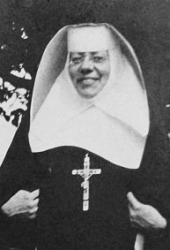
Catherine Marie Drexel
Daughter of the extremely wealthy railroad entrepreneurs and philanthropists Francis Anthony and Emma (Bouvier) Drexel. She was taught from an early age to use her wealth for the benefit of others; her parents even opened their home to the poor several days each week. Katharine's older sister Elizabeth founded a Pennsylvania trade school for orphans; her younger sister founded a liberal arts and vocational school for poor blacks in Virginia. Katharine nursed her mother through a fatal three-year illness before setting out on her own; Emma died in 1883.
Interested in the condition of Native Americans, during an audience in 1887, Katharine asked Pope Leo XIII to send more missionaries to Wyoming for her friend, Bishop James O'Connor. The pope replied, "Why don't you become a missionary?"
She visited the Dakotas, met the Sioux chief, and began her systematic aid to Indian missions, eventually spending millions of the family fortune. Entered the novitiate of the Sisters of Mercy. Founded the Sisters of the Blessed Sacrament for Indians and Colored, now known simply as the Sisters of the Blessed Sacrament in Santa Fe, New Mexico, USA in 1891. Advised by Mother Frances Cabrini on getting the Order's rule approved in Rome. She received the approval in 1913.
By 1942 she had a system of black Catholic schools in 13 states, 40 mission centers, 23 rural schools, 50 Indian missions, and Xavier University in New Orleans, Louisiana, the first United States university for blacks. Segregationists harassed her work. Following a heart attack, she spent her last twenty years in prayer and meditation. Her shrine at the mother-house was declared a National Shrine in 2008.
26 November 1858 at Philadelphia, Pennsylvania, USA
3 March 1955 of natural causes at the mother-house of the Sisters of the Blessed Sacrament, 1663 Bristol Pike, Bensalem, Pennsylvania, USA 19020-8502
1 October 2000 at Rome, Italy by Pope John Paul II
The patient and humble endurance of the cross whatever nature it may be is the highest work we have to do. - Mother Katharine Drexel
Oh, how far I am at 84 years of age from being an image of Jesus in his sacred life on earth! - Mother Katharine Drexel
https://catholicsaints.info/saint-katharine-drexel/
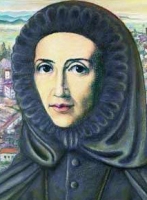
Ignazia Verzeri
Teresa's mother, Countess Elena Pedrocca-Grumelli, had felt drawn to the religious life, but her aunt, a Poor Clare nun, prophesied that Elena would be the mother of holy children. Teresa was the oldest of the seven children; her brother became bishop of Brescia, Italy. Ingazia was educated at home, and the canon Giuseppe Benaglio, Vicar General of the diocese of Bergamo, Italy was her spiritual teacher.
Benedictine nun at Bergamo. Dedicated to the education of young girls. Founder of the Institute of the Daughters of the Sacred Heart of Jesus on 8 February 1831. Built orphanages, retreat centers, and provided help to the old, sick and infirm; noted spiritual guide and teacher. An extensive correspondent, in addition to the Constitutions and Book of Duties for the congregation, she left over 3,500 letters. The Daughters continue their mission in Italy, Brazil, Argentina, Bolivia, the Central African Republic, Cameroon, India, and Albania.
31 July 1801 at Bergamo, Lombardy, Italy as Ignazia Verzeri
• 3 March 1852 at Brescia, Italy of natural causes
• her relics are in the chapel of the Daughters of the Sacred Heart of Jesus, Bergamo, Italy
10 June 2001 by Pope John Paul II
Daughters of the Sacred Heart of Jesus
To you and to your Institute Jesus Christ has given the precious gift of his Heart, for from no one else can you learn holiness, he being the inexhaustible source of true holiness. - Saint Teresa to the first members of the Daughters of the Sacred Heart of Jesus
The Daughters of the Sacred Heart of Jesus, like those who draw their charity from the very source of love, that is, from the Heart of Jesus Christ, must burn with the same love of the Divine Heart for their neighbor: purest charity that has no aim save for the glory of God and the good of souls; universal charity that excludes no one but embraces all; generous charity that does not draw back from suffering, is not alarmed by contradiction, but rather, in suffering and opposition, grows in vigor and conquers through patience. - Saint Teresa
https://catholicsaints.info/saint-teresa-eustochio-verzeri/
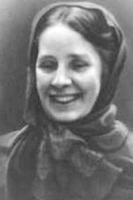
• Conchita
• María Concepción Cabrera Arias de Armida
Born during the Mexican Civil War, she grew up during the Revolution and the religious persecutions that were a part of it. Lay woman, married 22 years to the same man. Mother of nine children. Widowed at age 39. Grandmother. Founder of the Obra de la Cruz (Work of the Cross) which includes -
• the Apostolate of the Cross founded on 3 May 1895,
• the Congregation of Sisters of the Cross of the Sacred Heart of Jesus founded in 1897,
• the Alliance of Love with the Heart of Jesus founded in 1909,
• the Apostolic League founded in 1912, and
• the Congregation of Missionaries of the Holy Spirit founded in 1914.
Though her children claim they rarely saw her take the time to write, she left 65,000 hand-written pages of mystical meditations.
8 December 1862 at San Luis Potosí, Mexico
3 March 1937 at Mexico City, Mexico of natural causes
• 4 May 2019 by Pope Francis
• beatification recognition celebrated in Mexico City, Mexico, presided by Cardinal Giovanni Angelo Becciu
I Am: Euchararistic Meditations on the Gospel
She is a woman of our time, who comes to cry out to us that one can be a saint outside the convent. – Cardinal Norberto Rivera, Archbishop of Mexico
I carry within me three lives, all very strong: family life with its multiple sorrows of a thousand kinds, that is, the life of a mother; the life of the Works of the Cross with all its sorrows and weight, which at times crushes me until I have no strength left; and the life of the spirit or interior life, which is the heaviest of all, with its highs and lows, its tempests and struggles, its light and darkness. Blessed be God for everything! – Venerable Conchita
https://catholicsaints.info/blessed-concepcion-cabrera-de-armida/
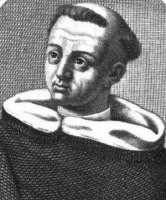
Pietro Geremia
Educated at the University of Bologna, Italy; brilliant law student. One night while he meditated on the worldly success he would have, he was visited by the spirit of a deceased relative, a man who had also been a lawyer, whose pride and perjury had lost him his chance at paradise. Shaken, Peter devoted himself to prayer, asking for his vocation. Soon he received a word that he should become a Dominican. In a rage, his father came to Bologna to stop him, but when he saw completely happy Peter was in religious life, the older man gave him his blessing. Peter became one of the finest preachers in Sicily, always preaching in the open air because no church was large enough to hold the crowds. Visited by Saint Vincent Ferrer. Abbey prior.
One day when there was no food for the community, Peter asked a fisherman for a donation; he was rudely refused. Getting into a boat, Peter rowed from the shore and made a sign to the fish; the creatures broke the nets and followed Peter. The fisherman apologized, Peter made another sign to the fish, and they returned to the nets. The monastery was ever afterwards supplied with fish.
Sent to establish regular observance in Sicilian monasteries. Called to Florence, Italy by the Pope to help heal the Greek schism; he managed a brief union. He was offered a bishopric, but refused.
Once when Peter was preaching at Catania, Mount Etna erupted and lava flowed toward the city. The people begged Peter to save them. He preached a brief sermon on repentance, went to the nearby shrine of Saint Agatha, removed the saint's veil, and held it towards the lava flow. The eruption ceased and the town was saved.
Peter was known as a miracle worker, raising the dead to life, healing the crippled and the blind, and converting sinners.
1381 at Palermo, Sicily
3 March 1452 in the convent of Santa Zita, Palermo, Sicily of natural causes
12 May 1784 by Pope Pius VI (cultus confirmed)
Palermo, Italy
https://catholicsaints.info/blessed-peter-de-geremia/
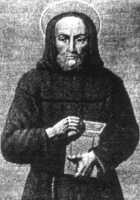
• Benedetto Sinigardi
• Benedict of Arezzo
13 August on some calendars
Born to a wealthy and influential noble family, the son of Thomas de Sinigardo ‘Sinigardi and Countess Elizabeth Tarlati Pietramala, Benedetto received a good education, grew up in a Christian home, and was early drawn to religious life. After hearing Saint Francis of Assisi preach in the Grande Piazza in Arezzo, Italy in 1211, Benedetto became the saint‘s spiritual student, then left the wealthy and worldly life, and joined the Franciscans, receiving the habit from Saint Francis himself. Chosen Franciscan Provincial of the Marches of Ancona, Italy in 1217 at age 27. Feeling a call to work as a missionary, he became a travelling preacher in Romania, Greece, Turkey, Syria and Palestine for 20 years. Assigned by Pope Innocent IV to work in the Latin Patriarchate of Constantinople. Custos of the Holy Land and Franciscan Provincial in 1221. Built the first Franciscan monastery in Constantinople. He returned to Arezzo in 1241 where he retired to live as a prayerful monk at the convent of Poggio del Sole; he spent another 40 years there. Benedetto introduced the singing of a Marian antiphony at the convent; he would ring a bell to announce it was time to do so. The tradition spread throughout the area, and was the basis for the modern Angelus bells and prayer. He wrote on spiritual matters, including the Passion and the Blessed Virgin Mary, but none of this work has survived. Known to the local laity as a miracle worker, popular devotion to him began immediately upon his death.
c.1190 in Arezzo, Italy
• 1282 in the Franciscan Poggio del Sole convent in Arezzo, Italy of natural causes
• buried at the convent
• re-interred in the Basilica of San Francesco in Arezzo when the convent was demolished
https://catholicsaints.info/blessed-benedetto-sinigardi-da-arezzo/
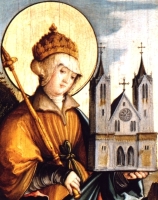
Chunigundis, Cunnegunda, Cunigunde, Cunegonda, Kinga, Kunegunda, Kunigunde
Daughter of Sigfrid, Count of Luxembourg. Received a religious education, and took a private vow of virginity. Married Saint Henry II, Duke of Bavaria, who agreed to honour her vow. On the death of Emperor Otho III, Henry was chosen King of the Romans, and Cunegundes was crowned queen at Paderborn, Germany in 1002. Holy Roman Empress in 1014, receiving the crown from Pope Benedict VIII.
At one point, gossips accused her of adultery, but she proved her innocence by asking for God's help, then walking over pieces of flaming iron without injury.
During his time as emperor, Henry gave away the bulk of his wealth in charity; when he died in 1024, Cunegundes was left relatively poor. On the 1025 anniversary of Henry's death, which coincided with the dedication of a monastery she had built for Benedictine nuns at Kaffungen, Cunegundes took the veil, and entered that monastery, spending her remaining 15 years praying, reading, and working beside her sisters.
• 1040 of natural causes
• interred in the Bamberg Cathedral, Bavaria near Saint Henry II in 1201
1200 by Pope Innocent III
• Bamberg, Germany, archdiocese of
• Bamberg, Germany, city of
• Lithuania
• Luxembourg
• Poland
https://catholicsaints.info/saint-cunegundes/
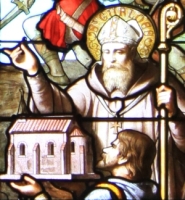
Bennoc, Guengalaenus, Guengaloeus, Guénolé, Guingaloëus, Guingalois, Gunnolo, Gwenndo, Gweno, Gwinocus, Gwnawg, Gwnnog, Gwynauc, Gwynawc, Gwyngawr, Gwynno, Gwynnoc, Gwynnocus, Gwynog, Ouignoualey, Valois, Vennole, Vinguavally, Vinvaleo, Waloway, Wingaloeus, Winnol, Winocus, Winwalde, Winwalloc, Winwalloe, Winwaloe, Winwaloëus, Wonnow, Wynnog, Wynolatus and Wynwallow
28 February (translation of his relics)
His father was Fragan, a Welsh noble who had recently emigrated to Brittany to escape a Saxon invasion. Ward and spiritual student of Saint Budoc on Lauren Island. Monk. Following a pilgrimage at age 20 to key Saint Patrick related sites in Ireland, Winwallus founded Landevennec monastery with eleven fellow monks at Brest, France. Abbot. The initial monastery site had to be abandoned due to poor soil and harsh weather, but Winwallus spent the rest of his days at the second site.
Legend says he lived on rye bread and ashes, water, and prayer, that he slept on sand or piles of tree bark, and that these privations led to his performing many miracles. Several churches in Cornwall, including Anglican parishes, are dedicated to him, which may indicate that his relics were moved there after the Viking invasions of 914.
c.462 at Plou-Fragan, Brittany, France
3 March 530 of natural causes at Tibidi, Brittany, France
Y Vaenor, Brecknockshire, Wales
• carrying a church on his shoulders or in his hands
• ringing a bell
https://catholicsaints.info/saint-winwallus/
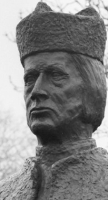
Son of a poor widow. Had a special devotion to the Blessed Virgin Mary, to Saint John the Baptist, and to Saint Cecilia. Teacher in his home town. Priest. Vicar of his native Hallum. Premonstratensian monk. Founded the monastery of Mariengarten, Netherlands. Simultaneously abbot of Mariengarten, Groingen, and Dockum.
Hallum, Frisia (in modern Netherlands)
• 3 March 1175 in Frisia (modern Netherlands) of natural causes
• so many miracles were reported at his grave that it became a pilgrimage site
• relics transferred to the abbey church in Bonne-Espereance in 1616 due to Calvinist rule in Frisia; they were in the habit of destroying relics
• relics transferred to Vellereille during the French Revolution to prevent their destruction
• relics transferred to Leffe, Dinant, Belgium in 1938
8 March 1728 by Pope Benedict XIII (cultus confirmation)
https://catholicsaints.info/blessed-frederick-of-hallum/
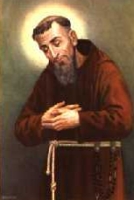
• Giovanni Scalvinoni
• Innocenzo de Berzo
28 September (Capuchins)
Capuchin priest. Having a special gift working with those seeking the Franciscan life, he was made assistant novice master, then director of candidates for the Order. Died on a preaching tour. His beatification miracles involved cures of terminally ill children.
19 March 1844 at Niardo, Brescia, Italy as Giovanni Scalvinoni
3 March 1890 at Begamo, Italy from influenza
12 November 1961 by Pope John XXIII
Berzo Inferiore, Italy
https://catholicsaints.info/blessed-innocent-of-berzo/
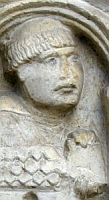
Anselm of Friuli
Duke of Friuli, Italy. Brother-in-law of the Lombard King Aistulph. Career soldier. Cleric. Founded the abbeys in Fanano, Modena, Italy, and of Nonantola, Italy. Both included hospitals and hostels. Anselm became a Benedictine monk in Rome, Italy in 753. Abbot of the house at Nonantola, which grew to a thousand brothers under his leadership. Received permission from Pope Stephen III to transfer the body of Pope Saint Sylvester I to the house. Banished to Monte Cassino by King Desiderius, but restored by Charlemagne after seven years in exile.
at Forum Juhi, (modern Friuli), Italy
803 of natural causes
Nonantola, Italy
https://catholicsaints.info/saint-anselm-of-nonantola/
Marino
Soldier in the Roman army, and a closet Christian. When a centurian's post fell open, he and another soldier applied. Marinus was the first choice, but his rival cited an ancient law that required a centurian to offer sacrifice to the emperor. Marinus confessed his Christianity, and claimed he could not offer the sacrifice. He was given three hours to change his mind, and spent the time in church with the bishop Theotecnus, meditating on a sword and scroll of the gospels. And the end of his three hours he again refused to make the sacrifice, and was executed for his faith.
• beheaded c.262 at Caesarea, Palestine
• buried by the Senator Saint Asterius of Caesarea
https://catholicsaints.info/saint-marinus-of-caesarea/
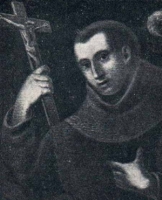
Samuele Marzorati
4 March (Franciscans)
Franciscan, joining on 5 March 1792 at Lugano, Switzerland, and taking the name Samuele. Priest. Missionary to Ethiopia. In 1716 the emperor declared a persecution of Christians. Father Samuele was arrested and ordered to renounce his faith; he refused. Martyr.
10 September 1670 in Biumo Inferiore, Varese, Italy
stoned to death by a mob on 3 March 1716 in Gondar, Ethiopia
20 November 1988 by Pope John Paul II
https://catholicsaints.info/blessed-antonio-francesco-marzorati/
Artelais, Artellais, Arthellais, Artellaide
Daughter of Roman imperial proconsul Lucius and Aithuesa. The emperor Justinian desired her, but she had taken vows of holy chastity and so fled to Benevento, Italy where she stayed with her uncle Narses Patricius. En route she was kidnapped by highway men, but was miraculously freed after three days.
544 at Constantinople
• 560 in Benevento, Italy of fever
• relics moved to the Benevento cathedral
• against bodily ills, illness or sickness
• exiled people
• kidnap victims
• sick people
• Benevento, Italy
https://catholicsaints.info/saint-arthelais-of-benevento/
The son of Gissur Teitsson, one of the first Christians in Iceland, and Þórdís Þóroddsdóttir. Married to Dalla Þorvaldsdóttir, they had three sons, including the future Bishop Gissur Ísleifsson. Following studies in Herford, Germany, he was ordained a priest. First bishop in Iceland, consecrated in 1056, and serving the remaining 24 years of his life. He built the cathedral of Skálholt, founded the first religious school, and got the Church establish in Iceland.
c.1006 in Iceland
5 July 1080 in Iceland of natural causes
https://catholicsaints.info/blessed-isleifur-gissurarson-of-skalholt/
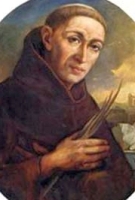
Liberat Weiss
4 March (Franciscans)
Franciscan, taking the name Liberat. Priest Missionary to Ethiopia. In 1716 the emperor declared a persecution of Christians. Father Liberat was arrested and ordered to renounce his faith; he refused. Martyr.
4 January 1675 in Konnersreuth, Bavaria, Germany
stoned to death by a mob on 3 March 1716 in Gondar, Ethiopia
20 November 1988 by Pope John Paul II
https://catholicsaints.info/blessed-johannes-laurentius-weiss/
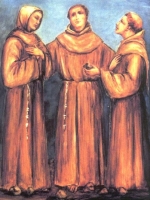
Michael Pío da Zerbo
4 March (Franciscans)
Franciscan priest Missionary to Ethiopia. In 1716 the emperor declared a persecution of Christians. Father Michele was arrested and ordered to renounce his faith; he refused. Martyr.
3 May 1676 in Zerbo, Pavia, Italy
stoned to death by a mob on 3 March 1716 in Gondar, Ethiopia
20 November 1988 by Pope John Paul II
https://catholicsaints.info/blessed-michele-pio-fasoli/
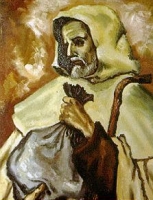
• Jacobinus of Crevacuore
• Jacobino, Jacopino
Born poor. Carmelite lay-brother at Vercelli, Italy. Alms-beggar for his house. Noted for his great piety and devotion to the Blessed Virgin.
1438 at Vercelli, Piedmont, Italy
3 March 1508 of natural causes
5 March 1845 by Pope Gregory XVI (cultus confirmed)
https://catholicsaints.info/blessed-jacobinus-de-canepaci/
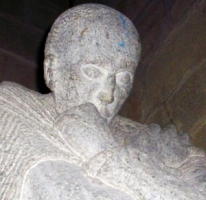
Pietro Renato Rogue
Priest. Member of the Congregation of the Mission (Vincentians). Ordered to take an oath of allegiance to the anti-Catholic government of the French Revolution; he refused. Martyr.
11 June 1758 in Vannes, Morbihan, France
3 March 1796 in Vannes, Morbihan, France
10 May 1934 by Pope Pius XI
https://catholicsaints.info/blessed-pierre-rene-rogue/

Nonna, Nonnita
Born to the nobility, possibly of a royal house. Married and widowed. Legend says she was the unwed mother of Saint David of Wales. Lived in convents in Wales, Cornwall, and Brittany.
• in Brittany, France of natural causes
• relics initially enshrined in Cornwall, England
• relics destroyed during the Reformation
https://catholicsaints.info/saint-non/
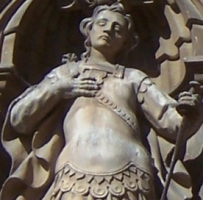
Emeterio, Emiterius, Hemeterius, Hemiterius, Madir
Soldier in Imperial Roman army in Spain. Martyr.
Spanish
4th century Calahorra, Old Castile, Spain
Calahorra, Spain
https://catholicsaints.info/saint-emeterius-of-calahorra/
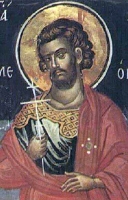
Clement, Cleonico
May have been a slave or soldier. One of a large groups martyred in the persecutions of Emperor Galerius. No other information has survived.
martyred in 308 in Pontus
https://catholicsaints.info/saint-cleonicus-of-pontus/
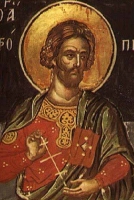
Eutropio
May have been a slave or soldier. One of a large groups martyred in the persecutions of Emperor Galerius. No other information has survived.
martyred in 308 in Pontus
https://catholicsaints.info/saint-eutropius-of-pontus/
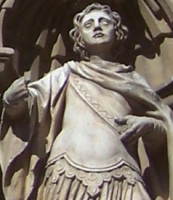
Soldier in Imperial Roman army in Spain. Martyr.
Spanish
4th century Calahorra, Old Castile, Spain
Calahorra, Spain
https://catholicsaints.info/saint-cheledonius-of-calahorra/
A pious young woman who lived with her mother, supported herself as a flax weaver, and was know to have the gift of prophecy. Reported to have saved a group of people from a Nile flood by her prayer after the local priests refused to try.
mid 4th century Egypt
late 4th century
https://catholicsaints.info/saint-piamun-of-egypt/
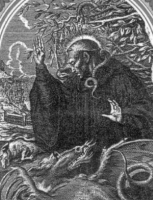
Caluppano, Caluppanus
Monk at Meallot, Auvergne, France. He spent his later years as a hermit in a cave near the monastery.
c.526
3 March 576 at Auvergne, France of natural causes
https://catholicsaints.info/saint-calupan/
Educated at episcopal school at Rheims, France. Benedictine. Canon of Rheims. Abbot. Friend of Saint Edward the Confessor. Great preacher, and very devoted to the Divine Office. Collected ancient Greek and Latin manuscripts. Leper.
at Rheims, France
1075 of natural causes
https://catholicsaints.info/saint-gervinus/
Asterus, Asturius
Roman senator. Martyred for giving a Christian burial to Saint Marinus of Caesarea.
beheaded c.262 at Caesarea, Palestine
https://catholicsaints.info/saint-asterius-of-caesarea/
Mo-Sacra
Descendant of Roderic, king of Ireland. Founded the monastery of Saggard, Dublin, Ireland, and served as its first abbot.
Irish
7th century of natural causes
https://catholicsaints.info/saint-sacer/
Tiziano
Evangelizing bishop of Brescia, Italy.
in Germany
c.536 of natural causes
https://catholicsaints.info/saint-titian-of-brescia/
Converted by and spiritual student of Saint Germain of Auxerre. Hermit.
at Civitavecchia, Italy
c.437 at Ecoulives, France of natural causes
https://catholicsaints.info/saint-camilla/
Hermit in Scotland. The small island of Lamlash near Arran, Scotland is named for him.
Scottish
7th century of natural causes
https://catholicsaints.info/saint-lamalisse/
Faile, Fallena, Follenna
Sister of Saint Colgan. Co-patroness with him of the parishes of Kil-Faile and KilGolgan, County Galway, Ireland.
https://catholicsaints.info/saint-foila/
Christicola
Hermit. Reluctant bishop of Leinster, Ireland.
c.728 of natural causes
https://catholicsaints.info/saint-cele-christ/
A group of Christians martyred together in North Africa, date unknown. No details have survived, but we know these names - Antonius, Artilaus, Asclipius, Astexius, Basil, Bosimus, Carissimus, Castus, Celedonius, Claudianus, Cyricus, Donata, Emeritus, Emeterius, Euticus, Felix, Fortunatus, Frunumius, Gajola, Georgius, Gorgonius, Hemeterus, Isicus, Janula, Julius, Luciola, Luciolus, Marcia, Marinus, Meterus, Nicephorus, Papias, Photius, Risinnius, Sabianus, Savinianus and Solus
https://catholicsaints.info/40-martyrs-in-north-africa/
A group of Christians martyred together in Africa, exact location unknown, date unknown, and the only other details we know are the names - Antonius, Artilaus, Asclipius, Astexius, Basilius, Bosimus, Carissimus, Castus (2 of this name), Celedonius, Claudianus, Cyricus, Donata, Emeritus, Emeterius, Euticus, Felix (5 of this name), Florian, Fortunatus, Fotius, Frunumius, Gajola, Georgius, Gorgonius, Hemeterus, Isicus, Janula, Julius, Justus, Luciola, Luciolus, Marinus, Meterus, Nicephorus, Papias, Risinnius, Sabian, Savinianus and Solus.
https://catholicsaints.info/martyrs-of-africa-3-march/
A group of 19 Christians in the early Church who were martyred, date and location unknown. We know nothing else about them but the names – Antigonus, Donatus, Felix, Fortunus, Gabianus, Gagus, Gajosa, Gallosa, Gallus, Helbianus, Hieroles, Januarius, Marcian, Marinus, Martia, Paul, Quiriulus, Tupicinus and Tutella.
https://catholicsaints.info/martyrs-of-rome-3-march/
CatholicSaints.Info Portable Edition